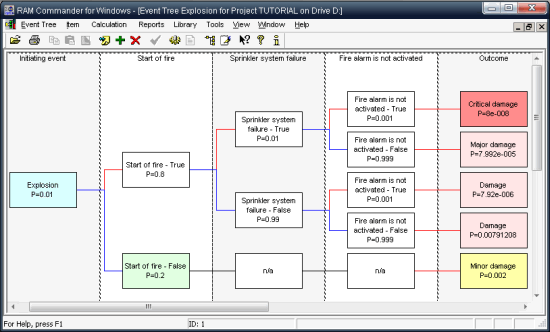Event Tree Analysis is one of the most widely used methods in system risk analysis. It is an inductive failure analysis performed to determine the consequences of a single failure for the overall system risk or reliability. Event Tree Analysis uses similar logic and mathematics as Fault Tree Analysis, but the approach is different - FTA uses a deductive approach (from a system failure to its causes), while ETA uses an inductive approach (from a basic failure to its consequences).
An event tree itself is a visual representation of single failure sequences, together with a single failure impact on other events and on the whole system.
ETA Module Features
• Customizable graphical representation (colors of diagram elements, their styles, etc.)
• Events Library
• Event Probability assessment models:
o user-defined
o calculated (repairable/unrepairable/constant mission time/periodical tests)
o linked to product tree element
o linked to FMECA Failure Mode, NHE or End Effect
o linked to Fault Tree basic event
o linked to Fault Tree gate or tree top event
• Different Event logic types:
o Binary logic
- True/False
- Success/Failure
o Multiple alternatives (for events where not only True/False or Success/Failure outcomes are considered)
• Different Event probability types
o Equal event probabilities in all sequences
o Different event probabilities in different sequences (conditional probabilities)
RAM Commander homepage
Fault Tree Analysis Software Module
ALD Reliability and Safety Software Overview
Reliability&Safety Software Download
See ALD Reliability, Safety and Quality Services if you wish us to perform reliability prediction, analysis or other services for you.

